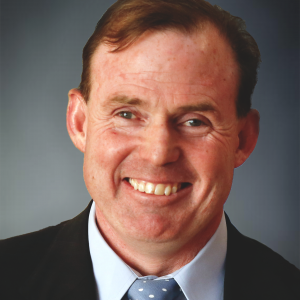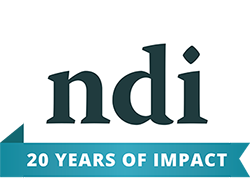Tom Foley began 2021 as the new Executive Director of National Disability Institute (NDI).
Trained as a tax lawyer and financial planner, Tom has more than 30 years of experience in the disability community. As a person who is blind, he has been an advocate and dedicated his career to partnering with other thought leaders to address the complex drivers of economic inequality and create pathways to employment and financial security for the most vulnerable communities. In addition, Tom has been instrumental in developing and influencing federal and state legislation to encourage employment and increase participation of people with disabilities in employment and wealth-building programs. He most recently held the position of Managing Director at the World Institute on Disability.

Tom Foley
In this interview, Tom discusses growing up with a disability, his aha moment about financial education for people with disabilities and his plans to lead National Disability Institute’s efforts in building a better financial future for people with disabilities and their families.
Your father had a disability. How did that influence your life as a child?
My father had a profound hearing loss from being a tank driver in World War II. He never really talked about his hearing loss and went to work every day as an engineer at the Board of Education. So, I grew up with the expectation that I would also work though I was legally blind from retinitis pigmentosa, a degenerative eye disease. From my dad, I had the expectation that you just push through. He was quite the role model. Both my parents had expectations of me – that I would clean my room and get good grades and that I would participate and succeed in society like anyone else. I didn’t realize until 20 years later that that wasn’t the case for everyone with a disability. Growing up on the South Side of Chicago, we pretended disability didn’t happen and didn’t talk about it, though my dad and I shared an unspoken bond, I think, because of our disabilities.
What impact did losing your vision have on your life?
I was always legally blind and never able to read newspapers or books. In school, I had large print books and could only see one or two letters at a time so reading aloud in class was torture.
After college I moved to California and went to grad school at UC Berkeley where I was first introduced to the independent living movement. I started working in disability employment after grad school in 1988, helping students and graduates with disabilities find jobs.
I decided to go to law school when I was 30. I had lost what sight I had by then and I couldn’t do my job any longer. This was before computers were ubiquitous and we were still a very paper heavy society. I wound up going on Social Security Disability Insurance (SSDI) for a while and, though I was grateful for the support it provided me, I made a decision that I didn’t want to be on disability benefits for the rest of my life. I wanted more and law school seemed a proven, reliable vehicle to get there. After law school I looked for work for quite a long time and finally became a consultant to support myself. In 2006, I was hired by the World Institute on Disability and had the opportunity to work on asset building for people with disabilities. That’s where I met Michael Morris, the founder of National Disability Institute, and became aware of the work the organization did around the financial empowerment of people with disabilities.
When and why did the issue of the financial capability of people with disabilities become important to you?
When I was a sophomore in high school, I took a Consumer Economics class which touched on areas of financial education – topics like earning interest and paying interest on a credit card, long-term investing and saving. I was absolutely smitten and realized the financial decisions I made had real-life long-term implications to me and the more information I got the better I could plan my own financial future. I moved to California when I was 20 and spent all my spare time sermonizing about financial inclusion to the disability community. I’m not sure they knew what to make of me.
This realization, though, changed my life: If you figure out your financial future you have control of your life. And then no one can tell you what you can and cannot do. Choices matter, every day, and those choices build your future. I think a principal of financial empowerment is to give people the hope to change their own lives. And remember, financial education materials for people with disabilities didn’t exist back then. I wish I had had access to all the great materials that NDI has available – I probably wouldn’t have made some of the financial mistakes I made in my 20s and 30s and, well, 40s.
What does financial inclusion mean to you?
To me, financial inclusion means having access to information. There is a significant accessibility piece around this as, until recently, I could not find an accessible budget template. It also means offering research and information that speaks to the financial concerns of people with disabilities and is relevant to people with disabilities. Most of the financial empowerment materials I found didn’t mention the extra and unique costs that people with disabilities experience. For example, paying a higher rent or mortgage to be closer to work, the cost of accessible vehicles or additional out-of-pocket medical costs. People with disabilities don’t need to be told what to spend their money on – but they do need the tools to make good financial decisions. We also have to provide information in regard to benefits, which can be very complicated and confusing. There is so much disinformation out there that really impacts people with disabilities’ ability to make informed choices around employment and their ability to build a better economic future for themselves. One of the things we could model better is how to get people to use Supplemental Security Income (SSI) and SSDI as a bridge to reinventing yourself.
Why is financial inclusion important?
A big piece of financial inclusion is having control over your own life. We talk a lot about independent living, but nothing helps more with independent living than financial stability, in my opinion. I think once people get to a place where they are financially stable it opens up more opportunities. It is a virtuous cycle – the more one pays attention to the right financial decisions the better their quality of life – better job, promotion, first house, better opportunities when one is working toward financial stability.
How can people with disabilities be more financially included in this country?
I think financial institutions, educators and banks each have to recognize the disability community as a specific market segment of the population that have been traditionally underserved and have a demonstrated need for access to financial tools and services. Once they make the decision to work with the disability community, they need to partner with organizations who are particularly well-positioned to provide industry technical assistance to reach the disability community and further the financial industry’s inclusion goals – like National Disability Institute. For example, NDI reaches two million people per year and has been doing this for 15 years. We are particularly well situated, through our research, policy and practice, to reach this community.
In addition, it’s important for banks and financial institutions to target people with disabilities through their CRA activities. NDI’s Center for Disability-Inclusive Community Development (CDICD) works to improve the usage of the opportunities and resources available under the Community Reinvestment Act (CRA). This is really important as millions of dollars, that could help people with disabilities in LMI communities, goes unspent every year. Through NDI’s research, we’ve identified that Black, Indigenous and People of Color (BIPOC) communities with disability are the most underserved. How do we change this? Financial institutions, in particular, need to make a concerted effort to work with and support this segment of the community. In addition, we, the disability community, need to be intentional in our own efforts to better address these issues.
Which new frontiers remain for people with disabilities?
Economic empowerment is such a lynchpin to working and participating in the economy. When people with disabilities participate in the workplace, it becomes a similarity not a difference. For instance, discussing the cost of a hobby or paying property taxes or taking the bus to work. When that happens, some of those longstanding biases of the disability difference start to go away. When someone experiences the same things that you do it’s hard to think of them as other – it helps us get to a place of equanimity.
As NDI’s new Executive Director, what are your priorities for the next year?
My priorities are to work with our newly elected officials and other organizations on policy issues affecting the financial stability of people with disabilities. I want to expand NDI’s work with financial institutions and the asset-building community to provide high quality research and continue to be the industry leader in convenings, pilots and qualitative research around economic inclusion for people with disabilities. Most importantly, to include all of the disability community in our work and continue to change economic expectations and outcomes for people with disabilities and their families.



